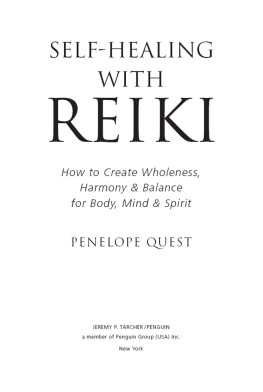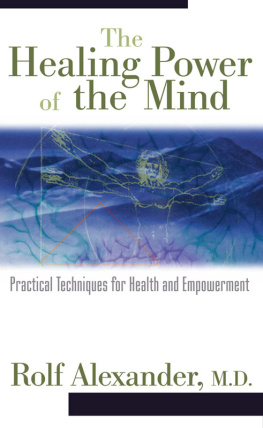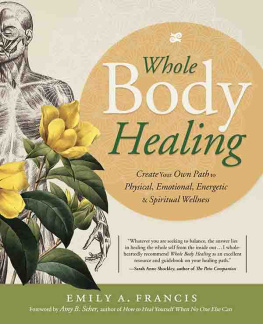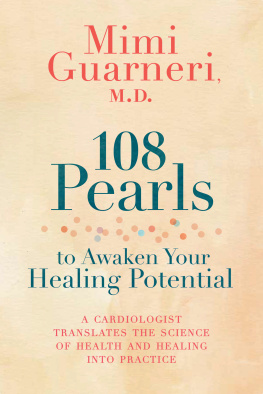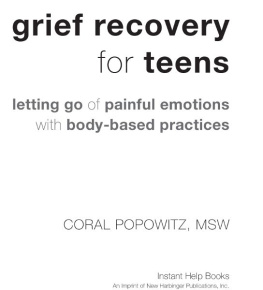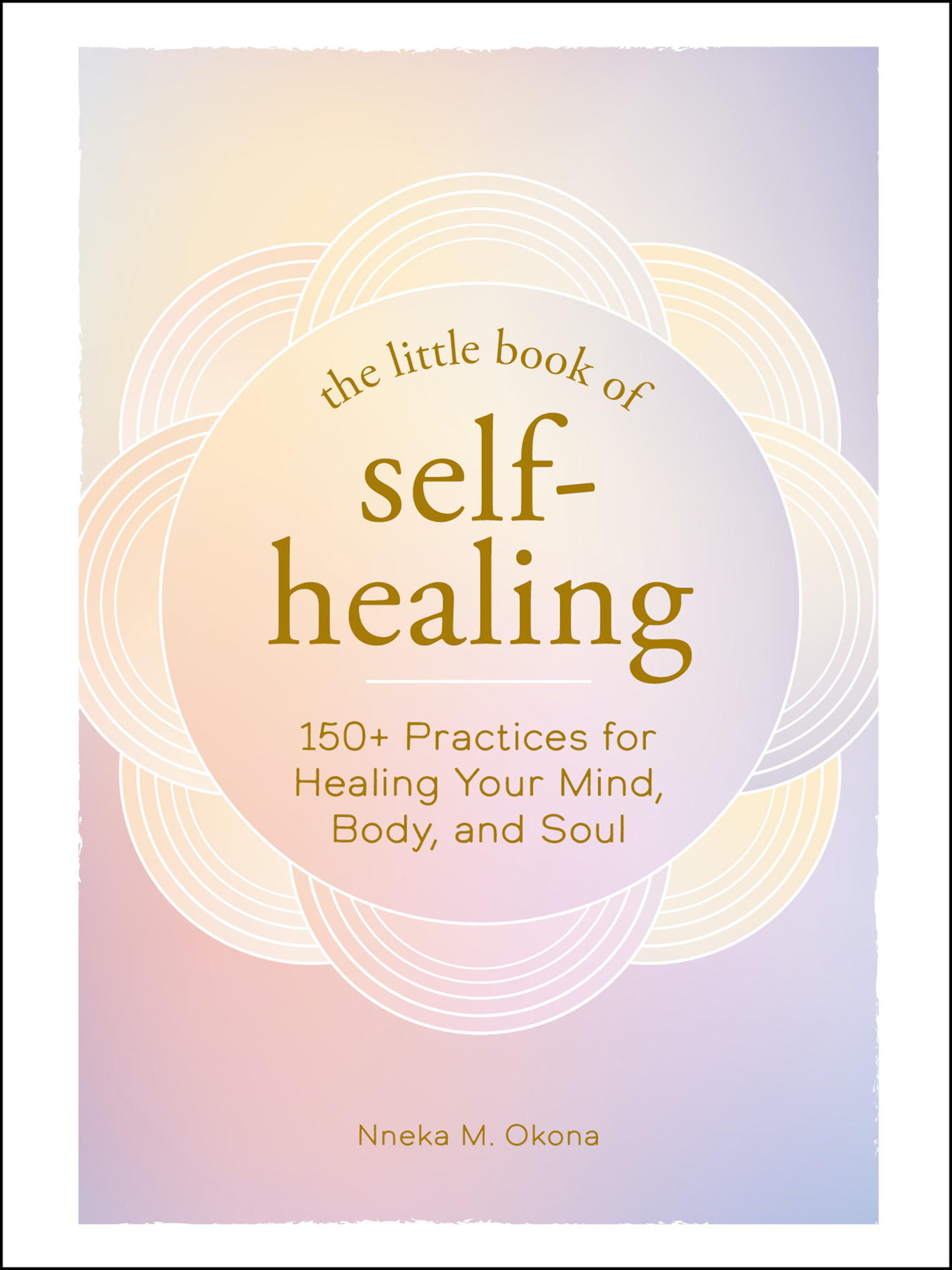Contents
Guide
The Little Book of
Self-Healing
150+ Practices for Healing Your Mind, Body, and Soul
Nneka M. Okona
To you.
To all those who need to heal.
May your healing
and the journey to getting there
be glorious.
introduction
Self-healing is a particular type of inner development. While healing is the practice of binding up a wound and beginning the path to restoration, self-healing is centering yourself in that process. Each day you intentionally focus on nurturing your mental, physical, or spiritual growththose important elements that make you who you are. You take charge of what in your life needs to be restored and empower yourself to do the things you need to do to get to a place of healing.
The Little Book of Self-Healing is your guide to healing yourself. Organized by the three main sections of mind, body, and spirit, each chapter offers dozens of actionable ways to take the lead and move forward in your journey of self-healing. With this book as a tool, youll be able to banish whatever obstacles may be keeping you from living the life of your dreams. Youll:
- Learn how to be kind to yourself
- Explore the benefits of herbal medicine
- Practice sitting with what you feel without judgment
- Befriend that wonderful, important person in your life: you
- And so much more
Through incorporating all parts of your being in the task of healing, you live and grow in authentic wholeness. You lean on everything you are in order to inspire the renewal that is to come.
Take heart. The path of self-healing is a fluid, ever-shifting one. Just as there will be peaks, where you feel ready to take on whatever comes your way, there may also be valleys, where you feel doubtful about your abilities or compare your progress with where you think you should be. This is all normal. At every point along the way, remember that you are enoughregardless of where you are in your healing journey. Because it is your journey. You deserve to take that next step, to grab the reins and seize whatever it is that you are wanting and needing in life. Turn the page to claim the power and potential within yourself!
mind
Is there ever enough to be said about the power of the mind? Our minds have the ability to imagine worlds never seen beforeand the power to keep us mired in what has threatened to break us and render us no longer whole. The mind also has a greater role in being a conduit of our self-healing. Through being cognizant that we possess the ability to facilitate growth and healing by working with, instead of against, our minds, we start to get somewheresomewhere beautiful, uncharted, free.
In this chapter, youll delve into activities that will help motivate and steer you toward healing your mental space. Youll become a student of your own healing by seeking out new resources, letting go of toxic positivity, calling to mind the joys in your life, and more. Self-healing starts with the decision to heal and being open to what comes as you do. Use this chapter to set off on your journey of healing with a focused, effective mental state.
Create a Reading List

Sometimes in order to make the process of healing less daunting, we need to learn. The knowledge we uncover will enlighten us along on our way. Your path to healing will be unique, but you can gain insight from practices that have worked so well for others. Gathering books and other resourcespamphlets, old journals, magazine articles, and encyclopedia entries focused on healingcan be a good start in your own healing journey.
Of course, intentional reading needs structure in order to not become another source of stress, and reading lists are effective in this endeavor. To create a reading list, gather the titles of the books, articles, and other resources youve found on healing and organize them in a way that makes sense. Organization streamlines your reading and makes it easy to keep track of. Choose a method that feels intuitiveyou might arrange them by main themes, resource length, resource type, or any other method you choose. Next, come up with a realistic time frame for reading each item on your list. For instance, for longer resources such as books, give yourself a full month to read, splitting up your study into weekly goals of a number of chapters or pages. Setting a time frame will help you stay accountable to your list.
Discern Trusted Sources

When you search for wisdom in order to grow, change, develop, or heal, you may find yourself overwhelmed with competing voices calling out to youadvice from professionals online, notes from a trusted therapist, or suggestions from close friends and family. The question then becomes, How do you know whether or not to trust the information youre hearing? Discernment is the key. Ask yourself if the information feels right for you on an intuitive level. It is also beneficial to approach everything with a healthy amount of skepticism versus automatically accepting something as true.
Beyond these discerning tools, use research to quantify information you come across. If something seems like a stretch or wishful thinking, assume it is. If a certain name keeps coming up as an expert on a particular topic, dig deeper to find out if this person can be trusted. Have they done any questionable things or been connected to scams or scandals? What are their professional qualifications? What about personal experiences with that topic? Keep looking for boundaries to ground your research into healing.
Opt for Certification or Other Continued Education

Sometimes what you read will not be enough. You may find the depth of information on certain aspects of healing to be more surface level or one-dimensional than you are looking for. Or perhaps the information is buried in terminology and concepts you are confused about. In those times, youll have to dig in deeper. When reading books, listening to lectures, or delving into your own disciplined self-study proves to be lacking, obtaining certification or further education can make the difference. For instance, there are certificate programs in healing practices such as breathwork, meditation, and Reiki. Be sure again to verify credentials and listen to your gut when choosing a certification, class, or other program to pursue.
Look up the teachers leading these programs, particularly those that require months of commitment and/or a fee. Ask for details about accreditation and, if possible, talk to former or current students of the program to aid in your decision-making process.
Become a Student of Your Own Healing

Schooling is ruled by standards, convention, and tradition. These standards can facilitate important growth, but they can also feel limiting. Conventional schooling may present issues in black and white, making it difficult to think outside of the box. However, being a student of your own mental healingand the transformation that followscan be freeing. It can allow you to learn and digest information at your own paceinformation tailored to what


